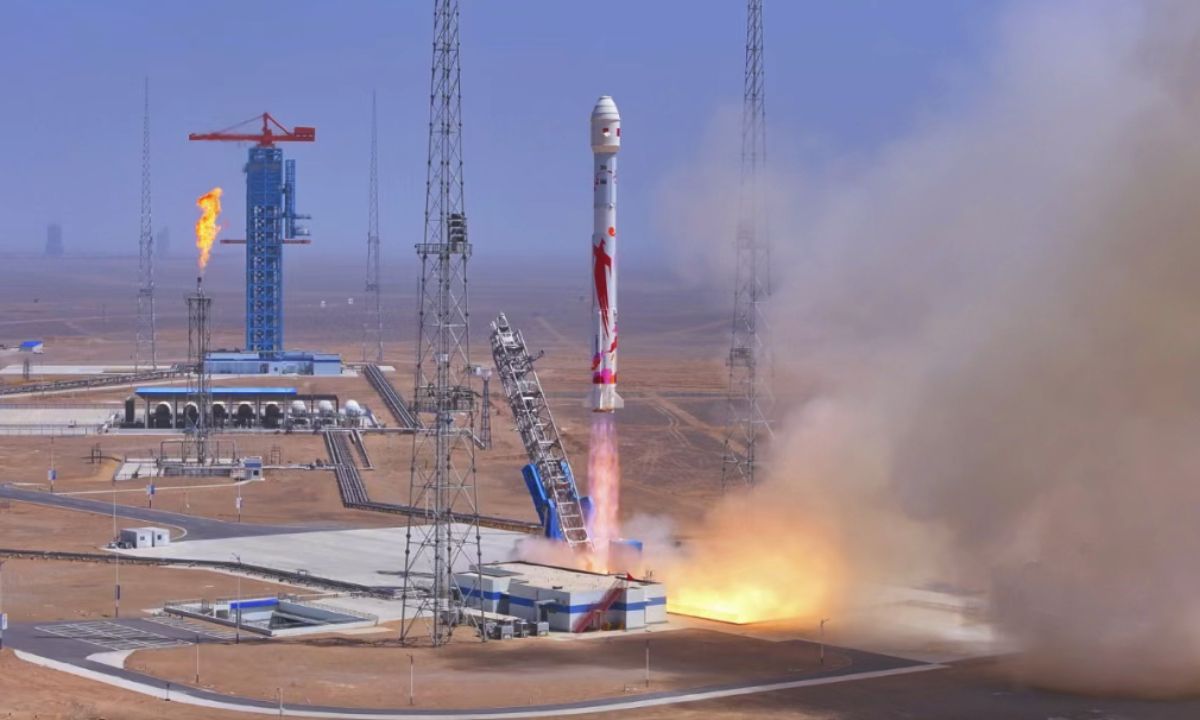China's ZQ-2E rocket successfully launches six satellites in major commercial space milestone

ZQ-2E, an enhanced version of the ZQ-2 – world’s first liquid
methane launch vehicle to reach orbit – lifted off from Dongfeng
Commercial Space Launch Site in Northwest China for its first
flight this year on Saturday around 12:12 pm. The mission
successfully delivered a batch of six Tianyi commercial satellites
into their preset orbits, marking a complete success,
Azernews reports, citing Global Times.
According to its developer, the Beijing-based space startup
LandSpace, the ZQ-2E model is China’s first dual-cryogenic
liquid-fueled launch vehicle to utilize fully subcooled propellant
loading.
ZQ-2E also incorporates key innovations such as a high-thrust
liquid oxygen-methane propulsion system, large-area ratio
niobium-tungsten alloy nozzle manufacturing technology, and an
integrated structure combining single-layer common bulkhead tanks
with single-layer tunnel-type feed lines, the firm stated in a
press release provided to the Global Times on Saturday.
Methane, derived from natural gas, is abundant, low-cost, and
easier to store than liquid hydrogen, Wang Yanan, chief editor of
Aerospace Knowledge magazine, told the Global Times on Saturday,
noting that the fuel also simplifies ground systems and reduces
launch costs, while its clean combustion enables long-term engine
reuse and easier cost control. Notably, SpaceX's Starship uses the
same type of propeller fuel, its official website shows.
ZQ-2E can deliver a payload of around 4 tons to a 500-kilometer
sun-synchronous orbit (SSO), targeting missions in low Earth orbit
(LEO) and SSO, and is steadily developing into a core product for
serving China's commercial space market, LandSpace said.
Saturday’s launch mission marked the second commercial mission of
the ZQ-2E, following its crucial maiden flight in late November
2024. To meet the Saturday mission requirements, ZQ-2E rocket was
equipped for the first time with a 4.2-meter-diameter,
8.7-meter-long composite fairing, significantly enhancing
compatibility with various types of large-scale payloads and
further improving the rocket's mission adaptability.
The rocket features a two-stage configuration. The first stage is
equipped with four Tianque-12A (TQ-12A) liquid oxygen-methane
engines in parallel, each delivering a sea-level thrust of 720
kilonewtons, providing strong thrust and attitude control
capabilities. The second stage uses a Tianque-15A (TQ-15A) engine
with a vacuum thrust of 836 kilonewtons, featuring 60 percent
throttling capability and the ability to restart up to three times.
Together with the Yunque (YQ-10) auxiliary propulsion system, it
supports precise operations such as thrust adjustment, orbit
maneuvering, terminal velocity correction, and attitude control,
meeting the demands of highly complex missions.
The mission marked the fifth flight of the ZQ-2 rocket series,
according to LandSpace. Wang emphasized the significance of this
launch to China’s commercial space industry, which showcased the
development potential of China’s commercial space firms, some of
which have achieved market-oriented operation.
“Moving forward, Chinese commercial space enterprises should focus
on increasing payload capacity, gradually developing toward crewed
spaceflight capability, achieving rocket reusability, and further
reducing launch costs,” said Wang.
At present, the launch capacity of state-owned aerospace entities
far exceeds private companies as the former are tasked with more
critical scientific missions related to the operation of Tiangong
space station and deep space exploration to the moon and Mars, Wang
noted. “Therefore, commercial missions such as building the
low-Earth orbit satellite internet represents a major opportunity
for private firms.”
Here we are to serve you with news right now. It does not cost much, but worth your attention.
Choose to support open, independent, quality journalism and subscribe on a monthly basis.
By subscribing to our online newspaper, you can have full digital access to all news, analysis, and much more.
You can also follow AzerNEWS on Twitter @AzerNewsAz or Facebook @AzerNewsNewspaper
Thank you!
